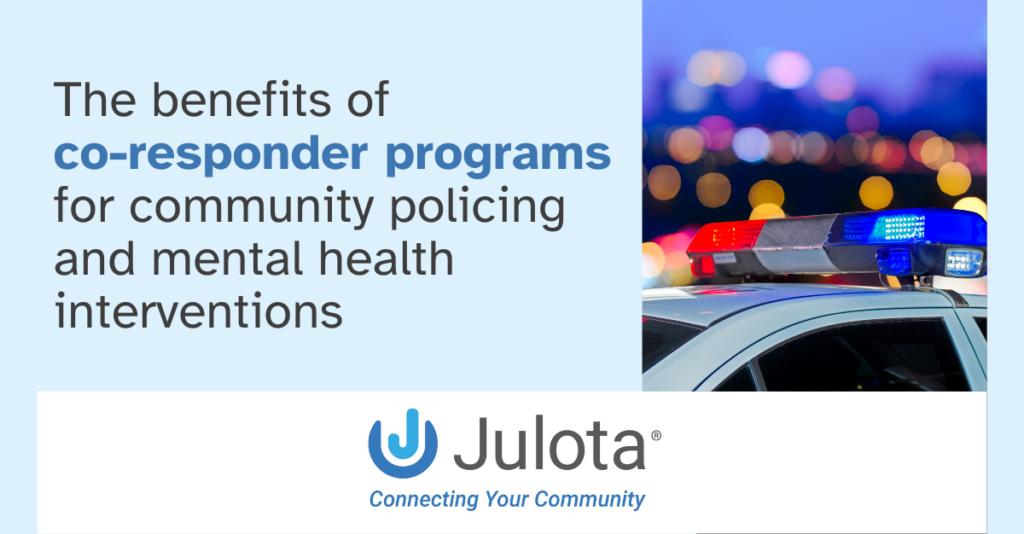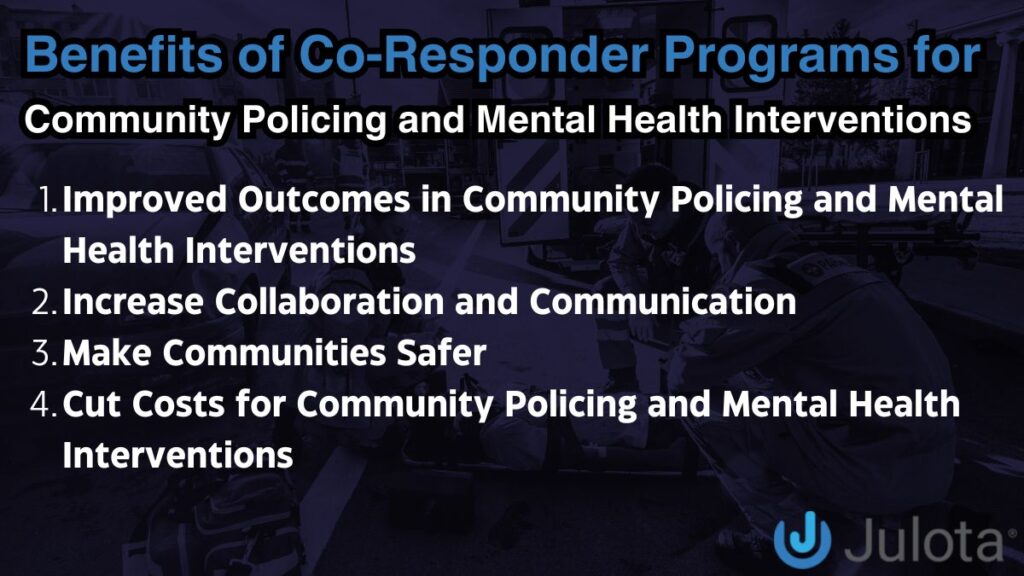Co-responder programs are typically collaborative teams comprised of law enforcement and mental health professionals who respond to mental health crises in the community. However, many alternative response types utilizing EMS and other community partners have recently appeared. These programs can bring many benefits to both community policing and mental health interventions.
Co-responder programs can help their communities by improving public safety, making access to appropriate mental health services more accessible, and reducing the burden on the criminal justice and emergency system.
Some of the benefits of co-responder programs for community policing and mental health interventions:
- Improved Outcomes in Community Policing and Mental Health Interventions
- Increase Collaboration and Communication
- Make Communities Safer
- Cut Costs for Community Policing and Mental Health Interventions

Co-Responder Programs Show Improved Outcomes in Community Policing and Mental Health Interventions
Co-responder programs can improve outcomes for individuals in crisis by providing them access to mental health expertise and resources. Rather than being arrested or taken to jail, individuals may be connected with mental health treatment and support services.
With community policing, the local law enforcement often is intimately familiar with the mental health needs of the citizens, and can call upon co-responder resources when needed. This can improve outcomes by using the right tool for the right job.
Co-responder teams typically include mental health professionals who can provide specialized assessment and intervention for individuals experiencing mental health crises. This can help ensure that individuals receive appropriate and timely care, and we know that the faster a person can receive correct care for any health crisis they are experiencing, the better their chances of substantial improvement.
Law enforcement officers and mental health professionals on co-responder teams can work together to de-escalate potentially volatile situations. Using verbal communication skills and other de-escalation techniques, co-responder teams can help prevent situations from escalating into violence or arrest. Community policing was the first step in the direction of taking care of individuals vs crimes, and co-responder programs are the next step.
Look at the record of the Denver Police Department’s co-responder program, which launched in 2016. The program pairs mental health clinicians with police officers to respond to mental health crises in the community. Since its launch, the program has helped reduce arrests and use of force, received positive feedback from law enforcement and mental health professionals, and is currently expanding to cover even more community needs.
Co-responder teams can also help individuals connect with needed services, such as mental health treatment, housing, and other support services. This can help individuals receive the ongoing care and support they need to manage their mental health and avoid future crises.
By diverting individuals from the criminal justice system and providing them with mental health support, co-responder teams can help reduce the trauma associated with arrest and incarceration. This can lead to better long-term outcomes for individuals and their families.
Co-Responder Programs Increase Collaboration and Communication
Co-responder programs require the collaboration and communication typically expected of law enforcement partners to occur between law enforcement and mental health professionals, which helps build better relationships between the two groups. This teamwork can also help identify gaps in services and resources, leading to better coordination and referrals for individuals in crisis.
The entire purpose of community policing is to build communication and collaboration inside of the communities that law enforcement protects, and co-responder programs enhance this proven strategy.
One of the main ways that co-responder programs increase collaboration and communication is by developing a better understanding between law enforcement and mental health professionals. By working together in the field, police officers and mental health clinicians can share their respective knowledge and expertise, which can lead to a more comprehensive and coordinated response to a crisis situation as well as in less extreme situations.
For example, in Eugene, Oregon, the Crisis Assistance Helping Out on the Streets (CAHOOTS) program pairs a mental health clinician with a medic responding to 911 calls related to mental health crises. The team is trained to de-escalate situations and provide mental health support rather than simply relying on already-stretched-thin law enforcement to handle the situation.
This collaboration has resulted in reduced arrests and use of force incidents and improved outcomes for individuals in crisis.
However, a critical thing for this collaboration to occur is to have a way to communicate and share information between branches of the program. A fantastic tool to help with this need is to use the co-responder software program Julota. It’s an acronym for Just Love On Them Always.
Julota is a flexible, interoperable, and compliant cloud-based platform that enables communities to implement essential initiatives like Mental Health and Law Enforcement Co-Responders and Crisis Intervention Teams (CIT). The data sharing program Julota is a significant benefit to your community program becoming connected and data-driven.
Co-Responder Programs Make Communities Safer
By providing individuals in crisis with access to mental health treatment and support, co-responder programs can help reduce the risk of harm to both the individual and the community. This can help create a safer and more resilient community overall.
One of the ways that co-responder programs make communities safer is by reducing the use of force in situations involving individuals with mental health issues. Police officers trained in crisis intervention techniques and working alongside mental health professionals are better equipped to de-escalate situations and provide appropriate support to individuals in crisis, which can help prevent the need for the use of force and reduce the risk of injury or harm to all parties involved.
For example, the co-responder program in Denver, Colorado, has helped to improve outcomes by 33% in situations involving individuals with mental health issues. This has helped to build trust between law enforcement and the community and has contributed to a safer and more peaceful community policing overall.
Another way that co-responder programs make communities safer is by providing individuals in crisis with the appropriate support and resources they need to address underlying mental health issues. By responding to incidents involving individuals in crisis, co-responder teams can provide on-the-spot mental health assessments, counseling, and referrals to appropriate community resources, which can help prevent future incidents and reduce the risk of harm to the individual and others.
For example, the co-responder program in San Antonio, Texas, has helped to reduce recidivism rates among individuals with mental health issues by connecting them to appropriate resources and support services. This has helped to reduce the burden on law enforcement and the criminal justice system and has contributed to a safer and more resilient community overall.
Many examples of co-responder programs that have helped their communities tremendously can be found in any area of the country.
By working alongside mental health professionals and responding to incidents involving individuals in crisis, law enforcement officers can help build trust between law enforcement and the community. This can help improve community relations and contribute to a safer and more peaceful community.
How Co-Responder Programs Cut Costs for Community Policing and Mental Health Interventions
Co-responder programs can be cost-effective, particularly when compared to the cost of incarcerating individuals in crisis. By diverting individuals to mental health treatment and support services, co-responder programs can help reduce the burden on the criminal justice system and save taxpayer dollars.
Individuals in crisis are often brought to emergency departments for evaluation and treatment, which can be costly and time-consuming. By providing on-the-spot mental health assessments and support, co-responder programs can help prevent unnecessary hospitalizations and reduce costs associated with emergency department visits.
Individuals with mental health issues are often overrepresented in the criminal justice system and often end up in jail or prison as a result of their actions tied to their untreated mental illness. Co-responder programs can help divert individuals from the criminal justice system and connect them with appropriate mental health services, reducing the burden on the criminal justice system and lowering costs associated with incarceration.
Co-responder programs can help improve communication and coordination for community policing and mental health interventions, which can help ensure that individuals in crisis receive appropriate and timely care. By reducing the need for multiple agencies and providers to get involved in a crisis situation and often repeat the same services over and over, co-responder programs can help streamline the process and reduce costs associated with redundant services.
By providing individuals in crisis with appropriate mental health services and support, co-responder programs can help prevent future incidents and reduce the risk of harm to the individual and others. This reduces the need for emergency services and law enforcement involvement in future crises, resulting in cost savings over time.
A great example of this is from the co-responder program in San Antonio, Texas, which has helped to reduce the burden on the criminal justice system and cut costs associated with unnecessary hospitalization and incarceration. By providing individuals in crisis with appropriate mental health services and support, the program has helped to reduce recidivism rates and improve outcomes for individuals with mental health issues.
If cost-cutting is a necessary need, as it is for many communities, then keeping track of data related to services is also essential. This is where having a data program like Julota is helpful.
Julota enables communities to better address mental health, opioid, and substance abuse difficulties, as well as emergency super-utilizers and interventions while expanding the impact of limited community resources by connecting the right service with the right person at the right time. Additionally, it is entirely HIPAA-/mental health (42 CFR part 2)-/Criminal Justice Information System- compliant and can interface with any law enforcement CAD system.
Overall, co-responder programs bring many benefits to both community policing and mental health interventions. By improving outcomes for individuals in crisis, reducing arrests and use of force, enhancing collaboration and communication, promoting community safety, and saving costs, co-responder programs can help build stronger, more equitable communities.
